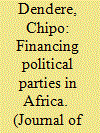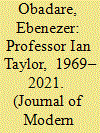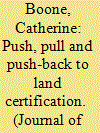|
|
|
Sort Order |
|
|
|
Items / Page
|
|
|
|
|
|
|
| Srl | Item |
| 1 |
ID:
180259


|
|
|
|
|
| Summary/Abstract |
Despite the proliferation of literature on large-scale land acquisitions (LSLA) in Africa, few empirical studies exist on how patronage networks combine with socio-cultural stratification to determine the livelihood outcomes for African agrarian-based communities. This article draws from ethnographic research on Cameroon to contribute to bridging this gap. We argue that lineage and patronage considerations intersect to determine beneficiaries and losers during LSLA. Second, we show that LSLA tend to re-entrench existing inequalities in power relations that exist within communities in favour of people with traceable ancestral lineage. Concomitantly, non-indigenous groups especially migrants, bear the brunt of exclusion and are unfortunately exposed to severe livelihood stresses due to their inability to leverage patronage networks and political power to defend their interests. We submit that empirical examination of the impacts of land acquisitions should consider the centrality of power and patronage networks between indigenes and non-indigenes, and how this socio-cultural dichotomy restricts and/or mediates land acquisition outcomes in Cameroon.
|
|
|
|
|
|
|
|
|
|
|
|
|
|
|
|
| 2 |
ID:
180258


|
|
|
|
|
| Summary/Abstract |
What is the impact of access to political party finance – money that parties use to fund their campaign activities – on politics in Africa? While multiparty elections have become more regular in the developing world, many opposition parties are still failing to win elections. This paper argues that poor access to political finance weakens democratic consolidation and negatively impacts the participation of less-resourced candidates who are unable to self-fund. As a result, opposition parties are forced to rely on weak promises of aid from international donors and unreliable state funding. This in-depth analysis of political finance, based on extensive interviews with politicians and government officials in Zimbabwe, political documents, news reports and a review of court cases, reveals that uneven financing has weakened opposition parties and serves as an extra advantage for incumbents.
|
|
|
|
|
|
|
|
|
|
|
|
|
|
|
|
| 3 |
ID:
180262


|
|
|
|
|
| Summary/Abstract |
Rather than examining what constitutes urban life in a particular city, this paper draws attention to how cities are ‘placed’ along individuals’ life trajectories. The outcome of 15 months of ethnographic research among 102 residents of Lagos's Gowon Estate neighbourhood suggests that Lagos is better understood relationally, through subjective narratives of city life. Given its scale and position among Nigerian cities, the meanings of Lagos to different individuals must be illuminated via an examination of how they ‘place’ those urban places that are important to them – Lagos, hometowns and regional centres – both conceptually and practically within their lived experiences and current livelihoods. In short, this paper exemplifies and advocates a methodology that does not treat cities as a central analytical unit, but instead interprets the meanings of living in cities based on individual inhabitants’ narratives, networks and other aspects of their lived experiences in Lagos and elsewhere.
|
|
|
|
|
|
|
|
|
|
|
|
|
|
|
|
| 4 |
ID:
180255


|
|
|
| 5 |
ID:
180256


|
|
|
|
|
| Summary/Abstract |
Since 2000, many African countries have adopted land tenure reforms that aim at comprehensive land registration (or certification) and titling. Much work in political science and in the advocacy literature identifies recipients of land certificates or titles as ‘programme beneficiaries’, and political scientists have modelled titling programmes as a form of distributive politics. In practice, however, rural land registration programmes are often divisive and difficult to implement. This paper tackles the apparent puzzle of friction around rural land certification. We study Côte d'Ivoire's rocky history of land certification from 2004 to 2017 to identify political economy variables that may give rise to heterogeneous and even conflicting preferences around certification. Regional inequalities, social inequalities, and regional variation in pre-existing land tenure institutions are factors that help account for friction or even resistance around land titling, and thus the difficult politics that may arise around land tenure reform. Land certification is not a public good or a private good for everyone.
|
|
|
|
|
|
|
|
|
|
|
|
|
|
|
|
| 6 |
ID:
180257


|
|
|
|
|
| Summary/Abstract |
Coup leaders often purport to restore constitutional order. During Burkina Faso's 2014 ‘insurrection', however, Blaise Compaoré's opponents advanced detailed (international) legal arguments that significantly constrained their subsequent conduct. Theirs was to be a legal revolution. This article situates this stance within Burkina Faso's distinctive history of urban protest, whilst emphasising under-analysed international sources for the insurrection. ‘Insurgent’ lawyers, it argues, used international instruments to reinvigorate longstanding activist attempts to reconcile constitutional rights with a language of popular justice promoted by the revolutionary regime of Thomas Sankara (1983–7). After the insurrection, however, their emphasis on legality was used by Compaoré's supporters to expose the transitional authorities’ double-standards. Meanwhile, insurgent lawyers working for the transition had to work hard to reconcile (international) legal justifications for the insurrection with the expedient politics needed to defend the new dispensation.
|
|
|
|
|
|
|
|
|
|
|
|
|
|
|
|
| 7 |
ID:
180261


|
|
|
|
|
| Summary/Abstract |
The article analyses Russia's recent return to Africa. It attempts to answer the question to what extent Russia has abandoned its traditional tools of cooperation such as nuclear energy and military cooperation and engaged in new ‘smart’ ones as indicated by former Foreign Minister Ivanov in 2011. The paper builds on three case studies of African countries having the largest trade volume with Russia in 2018, i.e. Egypt, Algeria and Morocco, and analyses their changing relationship with Russia over the last decade. The results show that Russia has not abandoned its traditional tools but has intensified the use of new ones. The North African region as such has regained significance in Russia's foreign policy. Bilateral relations with all three North African countries have increased at both political and economic levels recently.
|
|
|
|
|
|
|
|
|
|
|
|
|
|
|
|
| 8 |
ID:
180260


|
|
|
|
|
| Summary/Abstract |
African attitudes to income inequality have hardly been studied. As a result, we may have been missing a crucial part of the answer to the question why Africa is so unequal. This paper presents evidence that, across all self-identified class categories, African respondents in 16 African states, representative of all the regions of the continent, are on average considerably more tolerant of inequality than respondents from 43 comparable developing and transition countries. The aim of the paper is to try and explain these differences. It concludes that (a) a modified version of Albert Hirschman's notion of the ‘tunnel effect’ and (b) religious devotedness in the African context provide explanations for the observed variation between African respondents and their counterparts elsewhere. Experienced inequality, in contrast to overall income distribution, influences the tunnel effect more widely than economic growth. Religious belief shapes inequality tolerance in Africa more than the observance of religious practices.
|
|
|
|
|
|
|
|
|
|
|
|
|
|
|
|
|
|
|
|
|